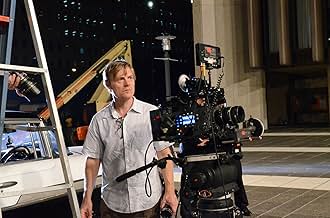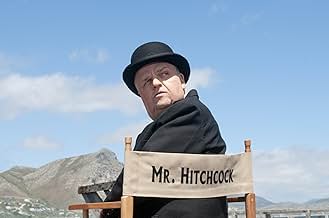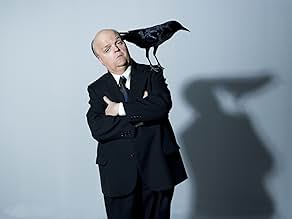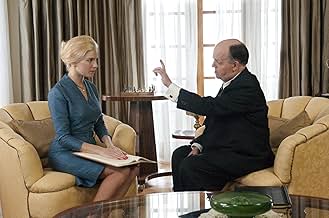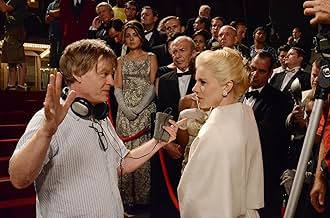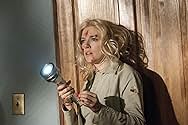VALUTAZIONE IMDb
6,3/10
7337
LA TUA VALUTAZIONE
Aggiungi una trama nella tua linguaThe turbulent relationship between filmmaker Sir Alfred Hitchcock (Toby Jones) and actress Tippi Hedren (Sienna Miller).The turbulent relationship between filmmaker Sir Alfred Hitchcock (Toby Jones) and actress Tippi Hedren (Sienna Miller).The turbulent relationship between filmmaker Sir Alfred Hitchcock (Toby Jones) and actress Tippi Hedren (Sienna Miller).
- Regia
- Sceneggiatura
- Star
- Candidato a 6 Primetime Emmy
- 3 vittorie e 36 candidature totali
Adrian Galley
- Martin Balsam
- (non citato nei titoli originali)
Louis Joubert
- Reporter
- (non citato nei titoli originali)
Leon Kowalski
- Photographer
- (non citato nei titoli originali)
Sean Cameron Michael
- Robert Burks
- (non citato nei titoli originali)
Carel Nel
- Clapper Loader
- (non citato nei titoli originali)
Recensioni in evidenza
As Total Film magazine said of this one-off drama, "it amounts to nothing less than a wholesale character assassination". They were right – it makes Albert Goldman's biography of John Lennon appear hagiographic.
While it looks great and Sienna Miller is fine as Hedren and Jones captures Hitch's voice well, The Girl is a narrow and nasty portrayal of the world's greatest film director. In its attempt to construct a drama it forgets some important points: people often have to suffer for their art; Alfred Hitchcock was a film director who knew his audience better than anyone, his understanding of the human condition was deep, and he realised that the thing that mattered most was the experience that the audience would derive from his work. If it meant discomfort and long hours on the set, that was a price worth paying – there's no room for fluffy dressing gowns and tea and biscuit breaks when you're trying to create a masterpiece, something that might last for centuries.
To suggest that Hitch unexpectedly sent a model bird crashing through a telephone box window just to terrify and "punish" Hedren, as opposed to being a desire to frighten the wits out of the audience, is absurd. The shoot of The Birds had been meticulously planned for – literally – years, and in any case, why would Hitch risk harming his leading lady's features? The greatest of people are endowed with light and shade, and possess the ability to view human existence from deep and differing positions. Hitchcock was one of these people. This greatness is something to be lauded – not bemoaned and belittled, as was the case with The Girl.
While it looks great and Sienna Miller is fine as Hedren and Jones captures Hitch's voice well, The Girl is a narrow and nasty portrayal of the world's greatest film director. In its attempt to construct a drama it forgets some important points: people often have to suffer for their art; Alfred Hitchcock was a film director who knew his audience better than anyone, his understanding of the human condition was deep, and he realised that the thing that mattered most was the experience that the audience would derive from his work. If it meant discomfort and long hours on the set, that was a price worth paying – there's no room for fluffy dressing gowns and tea and biscuit breaks when you're trying to create a masterpiece, something that might last for centuries.
To suggest that Hitch unexpectedly sent a model bird crashing through a telephone box window just to terrify and "punish" Hedren, as opposed to being a desire to frighten the wits out of the audience, is absurd. The shoot of The Birds had been meticulously planned for – literally – years, and in any case, why would Hitch risk harming his leading lady's features? The greatest of people are endowed with light and shade, and possess the ability to view human existence from deep and differing positions. Hitchcock was one of these people. This greatness is something to be lauded – not bemoaned and belittled, as was the case with The Girl.
Wow! Is that really what happened? In many biographies about Alfred Hitchcock, the most Tippi Hedren ever said about the incident when Alfred Hitchcock supposedly propositioned her was, "Demands were made of me that I could not acquiesce to." But in "The Girl", Toby Jones' Hitchcock puts it right out there when he says to Sienna Miller's Tippi Hedren, "From now on, I want you to make yourself sexually available to me at all times. Whatever I want you to do, whenever I want you to do it."
Possibly it happened that way, Tippi Hedren seems to have been consulted by the filmmakers. My feeling is that where there was that much smoke there had to be fire, but just how fair is "The Girl"?
The movie is nothing less than interesting. Toby Jones is amazing, and Sienna Miller more than holds her own, but opinion over the film is divided. On one side are those outraged that Hitchcock's reputation has been besmirched without a chance to defend himself, while on the other are those outraged at what Hitchcock appears to have done to Tippi Hedren.
"The Girl" relates how Alfred Hitchcock groomed the inexperienced Hedren to star in "The Birds" and "Marnie". During the process, Hitchcock changed from mentor to monster becoming totally obsessed with her. Eventually he made an overt sexual advance. She refused and that was the end of the relationship.
One scene in "The Girl" does undermine it. It's the somewhat salacious screen test where Hitchcock asks Hedren to give Martin Balsam a long lingering kiss. Unfortunately for the makers of "The Girl", the actual test clip is fairly well known from documentaries and YouTube, and is a lot less threatening than the recreation. In reality, Balsam and Hedren actually seem quite comfortable with each other. It was silly to overdo a scene that is so accessible; it leaves you wondering how much over-egging went on with the rest of the custard.
The difference between Hedren and Hitchcock's other leading ladies was that they were better able to handle him. Most were established stars, surrounded by husbands, boyfriends and agents, but Hedren didn't have all that; she was just starting out and was far more vulnerable.
According to some sources, it was about this time that Hitchcock's judgement also seemed to be slipping. The suppressed voyeuristic tendencies and fantasies that helped inform his great films were taking on a harder edge. He now wanted to be explicit in what he showed.
Up until then, the Motion Picture Production Code kept him in check. Would films like "Rear Window", "Vertigo" or even "Psycho" be the enduring classics they are today if Hitchcock had been allowed to go all the way? The censor made him innovative and subtle. However, by the late 60's the Code was gone. No one ever ranks 1972's "Frenzy" among his greatest movies; plenty of rape and nudity on display there. Fortunately he never made "Kaleidoscope"; with what he had planned, it could have been a real legend killer.
As far as "The Girl" is concerned, maybe it's best to just enjoy the show. Toby Jones' Hitchcock is even better than his Truman Capote, genius really, the voice is perfect, and Sienna Miller is so beautiful that you can believe that a fat, old auteur could harbour a fantasy or two about her. But maybe the last words on the subject could be the classic line Hitchcock once directed at an actor who was getting a bit too worked up about things, "Don't worry, it's only a movie".
Possibly it happened that way, Tippi Hedren seems to have been consulted by the filmmakers. My feeling is that where there was that much smoke there had to be fire, but just how fair is "The Girl"?
The movie is nothing less than interesting. Toby Jones is amazing, and Sienna Miller more than holds her own, but opinion over the film is divided. On one side are those outraged that Hitchcock's reputation has been besmirched without a chance to defend himself, while on the other are those outraged at what Hitchcock appears to have done to Tippi Hedren.
"The Girl" relates how Alfred Hitchcock groomed the inexperienced Hedren to star in "The Birds" and "Marnie". During the process, Hitchcock changed from mentor to monster becoming totally obsessed with her. Eventually he made an overt sexual advance. She refused and that was the end of the relationship.
One scene in "The Girl" does undermine it. It's the somewhat salacious screen test where Hitchcock asks Hedren to give Martin Balsam a long lingering kiss. Unfortunately for the makers of "The Girl", the actual test clip is fairly well known from documentaries and YouTube, and is a lot less threatening than the recreation. In reality, Balsam and Hedren actually seem quite comfortable with each other. It was silly to overdo a scene that is so accessible; it leaves you wondering how much over-egging went on with the rest of the custard.
The difference between Hedren and Hitchcock's other leading ladies was that they were better able to handle him. Most were established stars, surrounded by husbands, boyfriends and agents, but Hedren didn't have all that; she was just starting out and was far more vulnerable.
According to some sources, it was about this time that Hitchcock's judgement also seemed to be slipping. The suppressed voyeuristic tendencies and fantasies that helped inform his great films were taking on a harder edge. He now wanted to be explicit in what he showed.
Up until then, the Motion Picture Production Code kept him in check. Would films like "Rear Window", "Vertigo" or even "Psycho" be the enduring classics they are today if Hitchcock had been allowed to go all the way? The censor made him innovative and subtle. However, by the late 60's the Code was gone. No one ever ranks 1972's "Frenzy" among his greatest movies; plenty of rape and nudity on display there. Fortunately he never made "Kaleidoscope"; with what he had planned, it could have been a real legend killer.
As far as "The Girl" is concerned, maybe it's best to just enjoy the show. Toby Jones' Hitchcock is even better than his Truman Capote, genius really, the voice is perfect, and Sienna Miller is so beautiful that you can believe that a fat, old auteur could harbour a fantasy or two about her. But maybe the last words on the subject could be the classic line Hitchcock once directed at an actor who was getting a bit too worked up about things, "Don't worry, it's only a movie".
The Girl is an interesting movie about Hitchcock's obsession with Tippi Hedren as they made two movies together. It's stylishly made, with good performances. It is focused very much on Hitchcock's cruelty to Hedren.
My main objection to this movie is that its focus makes it rather unbalanced. Hedren herself says this. She says working with Hitchcock was great at first, and while the movie portrays her as dealing with one indignity after another, she says this was only really a problem toward the end of Marnie. It might have been interesting to see more of Hitchock's process - I liked the scene where he helps her work on her lines - but it's a short movie and they had a story to tell.
What is more interesting than the movie is its detractors here. While some people just don't find The Girl interesting, the vast majority seem to dislike it because they don't believe it. Some reviews will even say they're not invested in Hitchcock's reputation, but then follow it up by saying they don't believe this happened.
First off, the movie is based on information from a book by a respected biography writer, based on what he was told by both Hedren and those who worked with her. And Hitchcock was certainly a dark, obsessive, and sometimes cruel (witness his vicious "practical jokes") person. His movies are about obsessions and cruelty, so it would hardly be surprising if he acted poorly with his actress.
Yet, many of the movie's critics express outrage that Hitchcock's name is being besmirched. They say Hedren lied; that she is just trying to scapegoat Hitchcock for her lack of major successes after the Hitchcock films. They say she couldn't act. They say she should have been grateful that Hitchcock gave her a career.
There is a phrase I don't like, because it sounds extremist and harsh and overly politically correct, but that I increasingly realize accurately describes something, and that is "rape culture," the idea that sexual harassment and attacks on women are so ingrained in our society that they aren't even seen as abnormal. The reactions to this movie seem to me examples of this. What is the difference between saying Hedren lied about Hitchcock and the claims that a woman lies about being raped? What does her acting ability have to do with anything? (And what are people basing their assessment on? I suspect most of us have only seen her in two movies, made by a director who got exactly the performances he wanted from his actors).
Many people are saying,essentially, "he didn't do it, and if he did do it, she deserved it."
Look, I understand that people feel a need to defend great artists, but many great artists are not especially great people. That's inevitable; art often comes from a strange place. Don't attack the victim because you think the aggressor was a cool dude.
My main objection to this movie is that its focus makes it rather unbalanced. Hedren herself says this. She says working with Hitchcock was great at first, and while the movie portrays her as dealing with one indignity after another, she says this was only really a problem toward the end of Marnie. It might have been interesting to see more of Hitchock's process - I liked the scene where he helps her work on her lines - but it's a short movie and they had a story to tell.
What is more interesting than the movie is its detractors here. While some people just don't find The Girl interesting, the vast majority seem to dislike it because they don't believe it. Some reviews will even say they're not invested in Hitchcock's reputation, but then follow it up by saying they don't believe this happened.
First off, the movie is based on information from a book by a respected biography writer, based on what he was told by both Hedren and those who worked with her. And Hitchcock was certainly a dark, obsessive, and sometimes cruel (witness his vicious "practical jokes") person. His movies are about obsessions and cruelty, so it would hardly be surprising if he acted poorly with his actress.
Yet, many of the movie's critics express outrage that Hitchcock's name is being besmirched. They say Hedren lied; that she is just trying to scapegoat Hitchcock for her lack of major successes after the Hitchcock films. They say she couldn't act. They say she should have been grateful that Hitchcock gave her a career.
There is a phrase I don't like, because it sounds extremist and harsh and overly politically correct, but that I increasingly realize accurately describes something, and that is "rape culture," the idea that sexual harassment and attacks on women are so ingrained in our society that they aren't even seen as abnormal. The reactions to this movie seem to me examples of this. What is the difference between saying Hedren lied about Hitchcock and the claims that a woman lies about being raped? What does her acting ability have to do with anything? (And what are people basing their assessment on? I suspect most of us have only seen her in two movies, made by a director who got exactly the performances he wanted from his actors).
Many people are saying,essentially, "he didn't do it, and if he did do it, she deserved it."
Look, I understand that people feel a need to defend great artists, but many great artists are not especially great people. That's inevitable; art often comes from a strange place. Don't attack the victim because you think the aggressor was a cool dude.
I stumbled across this one day while scanning through the channels. I saw "Hitchcock" in the description, so I decided to have a look. Now I'll admit, I don't know all that much about Hitchcock. I know he's a great director, but I know next to nothing about his personal life or any controversy that may have lead to this movie. Instead I focused on the movie itself. After watching, I decided to look it up, where I came across the rather large controversy that this film has created. So here's my humble take on the film.
"The Girl" is a brilliant film from a mechanical standpoint. The acting is brilliant. Toby Jones sounds almost IDENTICAL to Hitchcock. It was really quite eerie to listen to the two. He seemed to capture the mannerisms from the director quite well. Sienna Miller was okay, but was a bit dry in some parts. Otherwise it was a fine group of actors. Likewise, directing, cinematography and editing were all exceptional, so why does this film fail?
A question I have instead of all the "is this a true story?" is, if you have all of the makings of a great film-a great cast, a great director, great camera-work-why base the story on such a controversial and doubtful series of events? Why not use the tools you have to make a biopic of sorts? This is what baffles me. If this film had followed a different story, it would probably have a much better rating. Everything points to a successful film EXCEPT the story, so why do it?
I suppose this is the problem with film these days. People are more concerned about the shock factor than an actual quality film. It's a shame too, because this could have been much, much better and free from controversy.
"The Girl" is a brilliant film from a mechanical standpoint. The acting is brilliant. Toby Jones sounds almost IDENTICAL to Hitchcock. It was really quite eerie to listen to the two. He seemed to capture the mannerisms from the director quite well. Sienna Miller was okay, but was a bit dry in some parts. Otherwise it was a fine group of actors. Likewise, directing, cinematography and editing were all exceptional, so why does this film fail?
A question I have instead of all the "is this a true story?" is, if you have all of the makings of a great film-a great cast, a great director, great camera-work-why base the story on such a controversial and doubtful series of events? Why not use the tools you have to make a biopic of sorts? This is what baffles me. If this film had followed a different story, it would probably have a much better rating. Everything points to a successful film EXCEPT the story, so why do it?
I suppose this is the problem with film these days. People are more concerned about the shock factor than an actual quality film. It's a shame too, because this could have been much, much better and free from controversy.
This TV movie looks at Alfred Hitchcock's obsession with Tippi Hedren during the making of the Birds.
This is quite fascinating compared to the film "Hitchcock" starring Anthony Hopkins. It shows Hitchcock's obsession with his leading ladies in a more predatory abusive nature than the Hopkins movie. Wonder which is closer to the truth? Sienna Miller doesn't look much like Tippi - she has a harder look but she does a good job. Toby looks more like Hitch than Anthony Hopkins.
Watch "The Birds" first and then watch this. The peek a the behind the scenes creative process is fascinating for Hitchcock fans.
This is quite fascinating compared to the film "Hitchcock" starring Anthony Hopkins. It shows Hitchcock's obsession with his leading ladies in a more predatory abusive nature than the Hopkins movie. Wonder which is closer to the truth? Sienna Miller doesn't look much like Tippi - she has a harder look but she does a good job. Toby looks more like Hitch than Anthony Hopkins.
Watch "The Birds" first and then watch this. The peek a the behind the scenes creative process is fascinating for Hitchcock fans.
Lo sapevi?
- QuizRay Berwick, the bird trainer on The Birds (1963), is depicted as having contempt for Sir Alfred Hitchcock, even referring to him at one point as "the old fool". In reality, Berwick always spoke of Hitchcock with the utmost respect and affection, working with him again on Topaz (1969).
- BlooperIn this film, Alfred Hitchcock is seen proposing a toast to "Alfie and Tippi". In reality, Hitchcock never called himself "Alfie", and never liked to be called either "Alfie" or "Alfred"; he was always called "Hitch", at his own insistence.
- Citazioni
Alfred Hitchcock: There was a young man from Nantucket / Who had such a large cock he could suck it. / He looked in the glass / And saw his own arse / And broke his neck trying to fuck it.
- ConnessioniFeatured in 70th Golden Globe Awards (2013)
- Colonne sonoreTristan And Isolde: Act I Prelude
Written by Richard Wagner
Performed by Daniel Barenboim (as Daniel Baranboim)
I più visti
Accedi per valutare e creare un elenco di titoli salvati per ottenere consigli personalizzati
Dettagli
- Tempo di esecuzione1 ora 31 minuti
- Colore
- Mix di suoni
- Proporzioni
- 1.78 : 1
Contribuisci a questa pagina
Suggerisci una modifica o aggiungi i contenuti mancanti

Divario superiore
By what name was The Girl - La diva di Hitchcock (2012) officially released in Canada in English?
Rispondi
